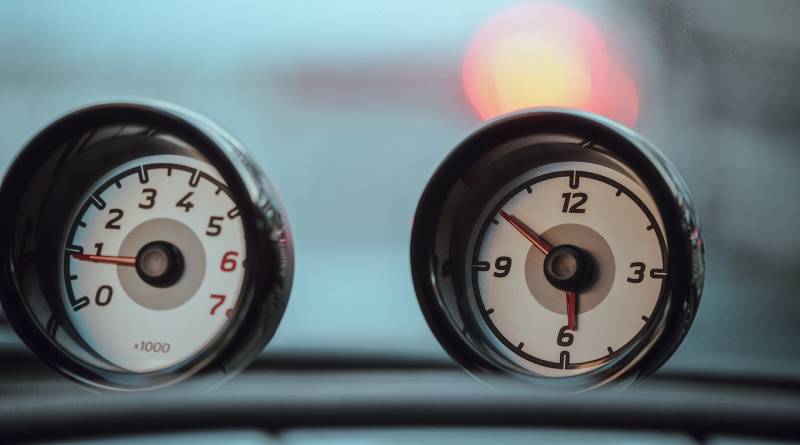Quick Navigation

You must have noticed the smaller meter that accompanies the speedometer of your car. An RPM meter indicates how fast a machine is operating at a given point in time. RPM stands for Revolutions Per Minute.
This indicates how many times a full engine crankshaft rotation is captured, every minute. Not just that, it keeps track of the number of times each piston moves up and down the cylinder within a minute.
A common problem faced by most of the drivers is the bouncing of RPM. Simply put, do you feel your car shouting and protesting with surges and mild vibrations whenever you let off the gas?
The reason for this is usually the instability of RPM. To learn more about the leading factors and solutions to this problem, stay tuned.
How Does RPM Work?
Upon letting off the gas, the RPM of a car should slowly drop to the fixed idle position. This constant idle RPM is usually 1000 RPM. In some vehicles, it can be 1500, but it should be constant when you let off the gas. In some cars, it can drop to 800 RPM.
An RPM below 800 is called low RPM. Whatever your vehicle’s idle settings may be, remember, RPM should stay constant when you let off the gas.
When you let off the gas, the car engine turns to its idle position. An engine’s vacant position is the least rotational speed, which is necessary to run the engine smoothly. This least rotational engine speed ensures some parts to work properly.
For instance, a water pump to flow the water in the radiator, the fuel pump will send limited gas to run and power the steering, but this rotational speed is not enough to drive the car.
An idle vehicle should always indicate an RPM between 600 to 1000. Any fluctuation can be indicative of some issues with the car engine.
Common Reasons For A Bouncing Rpm
If your vehicle’s RPM bounces up or drops down when you let off the gas, you should notice it quickly. Several reasons can cause bouncing RPM. Some of these reasons may be minor, and some may lead to any significant issue.
Although it seems a little innocent, it may indicate some deeper issues inside the engine. A vehicle with an unstable RPM should be inspected by a computer scanner or a qualified mechanic as soon as possible. Any delay or negligence can cause expensive repairs and further inconveniences.
Here are some common reasons that can cause the RPM of your car to bounce.
1. Faulty Fuel Injectors
A fuel injection system consists of tiny injectors. These injectors have small jet nozzles to inject fuel in the compression chamber. This fuel is mixed with air, which is then ignited by the spark plug to burn.
This blast generates the power to run the engine. The computer controls the EFI (Efficient Fuel Injection) system and allows fuel to flow through these injectors.
If any of the injectors are clogged, the car RPM begins to drop because of the lower fuel supply. It will cause the computer to flow more fuel to the cylinder, which causes the RPM to rise. In either case, clogged injectors can cause a bouncing RPM.
If addressed early, clogged injectors can be cleaned and reused. However, if not fixed well in time, these injectors may have to be replaced.
2. Faulty Spark Plugs
Spark plugs help burn the fuel mixture, generating power to run the engine. A faulty spark plug can miss the spark, which causes wastage of fuel mixture without any power generation.
It causes the RPM to bounce up and down while you are letting the gas off. A faulty spark plug can be cleaned, but a melted nozzle spark plug must be replaced.

3. Defective Fuel Pump
A fuel pump is responsible for continuous fuel supply to the cylinder. If the fuel pump gets clogged or stops working, it can cause the fuel supply to halt.
When letting the gas off, a faulty fuel pump can bar the fuel supply leading to a bouncing RPM. It is always better to replace a faulty pump for smooth throttling and a better driving experience.
4. Defective Idle Air Control Valve
The airflow sensor may be a reason for bouncing RPM when you let the gas off. An airflow sensor controls the air flowing inside the combustion chamber. This air, when combined with fuel, is blasted by the ignition of the spark plug.
Plenty of air will blast high and boost the RPM, whereas lack of air will produce low RPM. The combination of idle air control and airflow sensor helps the computer release sufficient fuel in the cylinder. Usually, there is no repair of the defective IAC valve, and it should be replaced with a new one.
5. Dirty Air Filters
Air filters ensure clean and sufficient air to flow inside the combustion chamber for a perfect blast. Over time these filters clog with dirty air and can cause blockage in airflow. These dirty air filters can cause RPM disturbance. For excellent airflow and smooth RPM, these air filters should be checked and replaced regularly.
6. Vacuum Problem
A faulty or leaked vacuum system can mislead the computer which manages the air to fuel ratio. This leak can cause unstable RPM and loss of power in many cases. Repair this leak immediately after identification to prevent any major problem.
7. Faulty Electrical Components
A perfect fuel mixture is the result of various sensors and electrical components. Any fault in these electrical components may cause severe problems in your vehicles.
These electrical systems include electrical wiring, plug wires, coils, and other sensors. For smooth RPM, all these components must be in proper working condition.
Wrap Up
At first, a bouncing RPM may feel like a mild inconvenience that can be ignored. But if you do not timely inspect your vehicle for this inconvenience, it may lead to some serious engine problems, annoying sounds, smoke release, start-on problems, etc.
An unaddressed bouncing RPM upon letting off the gas can lead to uncontrolled RPM while moving at high speed. Sometimes it may be dangerous to drive such vehicles.
A timely checkup of your vehicle can prevent such problems. Get your vehicle inspected soon if any such problems are encountered.
Always prefer a computer scan or a qualified mechanic for your vehicle checkup for well-maintained cars go a long way.

Kevin has been hanging around cars and automobile magazines since he knew what a car is. He grew up in his father’s 1995 Mercedes E320 Wagon and Volkwagon Phaeton W12 2004. He rides his first car, a manual 1979 Porche 911SC.
Currently, he owns an Acura Integra GS-R. During his childhood, he showed a keen interest in how things actually work and fix them. This passion transforms into his eternal love for cars and bestows him an ideal position in one of the leading automobile companies; whenever he finds time, he takes out his Acura and opts for the longest possible route to find hidden wholesome pleasure in a road trip.
Want to read some of the articles written by Kevin? Head to our blog section to find out all the articles written by Kevin.






